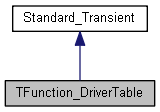A container for instances of drivers. You create a new instance of TFunction_Driver and use the method AddDriver to load it into the driver table. More...
#include <TFunction_DriverTable.hxx>

Public Member Functions | |
| TFunction_DriverTable () | |
| Default constructor. More... | |
| Standard_Boolean | AddDriver (const Standard_GUID &guid, const Handle< TFunction_Driver > &driver, const Standard_Integer thread=0) |
| Returns true if the driver has been added successfully to the driver table. More... | |
| Standard_Boolean | HasDriver (const Standard_GUID &guid, const Standard_Integer thread=0) const |
| Returns true if the driver exists in the driver table. More... | |
| Standard_Boolean | FindDriver (const Standard_GUID &guid, Handle< TFunction_Driver > &driver, const Standard_Integer thread=0) const |
| Returns true if the driver was found. More... | |
| Standard_OStream & | Dump (Standard_OStream &anOS) const |
| Standard_OStream & | operator<< (Standard_OStream &anOS) const |
| Standard_Boolean | RemoveDriver (const Standard_GUID &guid, const Standard_Integer thread=0) |
| Removes a driver with the given GUID. Returns true if the driver has been removed successfully. More... | |
| void | Clear () |
| Removes all drivers. Returns true if the driver has been removed successfully. More... | |
 Public Member Functions inherited from Standard_Transient Public Member Functions inherited from Standard_Transient | |
| Standard_Transient () | |
| Empty constructor. More... | |
| Standard_Transient (const Standard_Transient &) | |
| Copy constructor – does nothing. More... | |
| Standard_Transient & | operator= (const Standard_Transient &) |
| Assignment operator, needed to avoid copying reference counter. More... | |
| virtual | ~Standard_Transient () |
| Destructor must be virtual. More... | |
| virtual void | Delete () const |
| Memory deallocator for transient classes. More... | |
| virtual const opencascade::handle< Standard_Type > & | DynamicType () const |
| Returns a type descriptor about this object. More... | |
| Standard_Boolean | IsInstance (const opencascade::handle< Standard_Type > &theType) const |
| Returns a true value if this is an instance of Type. More... | |
| Standard_Boolean | IsInstance (const Standard_CString theTypeName) const |
| Returns a true value if this is an instance of TypeName. More... | |
| Standard_Boolean | IsKind (const opencascade::handle< Standard_Type > &theType) const |
| Returns true if this is an instance of Type or an instance of any class that inherits from Type. Note that multiple inheritance is not supported by OCCT RTTI mechanism. More... | |
| Standard_Boolean | IsKind (const Standard_CString theTypeName) const |
| Returns true if this is an instance of TypeName or an instance of any class that inherits from TypeName. Note that multiple inheritance is not supported by OCCT RTTI mechanism. More... | |
| Standard_Transient * | This () const |
| Returns non-const pointer to this object (like const_cast). For protection against creating handle to objects allocated in stack or call from constructor, it will raise exception Standard_ProgramError if reference counter is zero. More... | |
| Standard_Integer | GetRefCount () const |
| Get the reference counter of this object. More... | |
| void | IncrementRefCounter () const |
| Increments the reference counter of this object. More... | |
| Standard_Integer | DecrementRefCounter () const |
| Decrements the reference counter of this object; returns the decremented value. More... | |
Static Public Member Functions | |
| static Handle< TFunction_DriverTable > | Get () |
| Returns the driver table. If a driver does not exist, creates it. More... | |
 Static Public Member Functions inherited from Standard_Transient Static Public Member Functions inherited from Standard_Transient | |
| static const char * | get_type_name () |
| Returns a type descriptor about this object. More... | |
| static const opencascade::handle< Standard_Type > & | get_type_descriptor () |
| Returns type descriptor of Standard_Transient class. More... | |
Additional Inherited Members | |
 Public Types inherited from Standard_Transient Public Types inherited from Standard_Transient | |
| typedef void | base_type |
| Returns a type descriptor about this object. More... | |
Detailed Description
A container for instances of drivers. You create a new instance of TFunction_Driver and use the method AddDriver to load it into the driver table.
Constructor & Destructor Documentation
◆ TFunction_DriverTable()
| TFunction_DriverTable::TFunction_DriverTable | ( | ) |
Default constructor.
Member Function Documentation
◆ AddDriver()
| Standard_Boolean TFunction_DriverTable::AddDriver | ( | const Standard_GUID & | guid, |
| const Handle< TFunction_Driver > & | driver, | ||
| const Standard_Integer | thread = 0 |
||
| ) |
Returns true if the driver has been added successfully to the driver table.
◆ Clear()
| void TFunction_DriverTable::Clear | ( | ) |
Removes all drivers. Returns true if the driver has been removed successfully.
◆ Dump()
| Standard_OStream& TFunction_DriverTable::Dump | ( | Standard_OStream & | anOS | ) | const |
◆ FindDriver()
| Standard_Boolean TFunction_DriverTable::FindDriver | ( | const Standard_GUID & | guid, |
| Handle< TFunction_Driver > & | driver, | ||
| const Standard_Integer | thread = 0 |
||
| ) | const |
Returns true if the driver was found.
◆ Get()
|
static |
Returns the driver table. If a driver does not exist, creates it.
◆ HasDriver()
| Standard_Boolean TFunction_DriverTable::HasDriver | ( | const Standard_GUID & | guid, |
| const Standard_Integer | thread = 0 |
||
| ) | const |
Returns true if the driver exists in the driver table.
◆ operator<<()
|
inline |
◆ RemoveDriver()
| Standard_Boolean TFunction_DriverTable::RemoveDriver | ( | const Standard_GUID & | guid, |
| const Standard_Integer | thread = 0 |
||
| ) |
Removes a driver with the given GUID. Returns true if the driver has been removed successfully.
The documentation for this class was generated from the following file:
 1.8.13
1.8.13